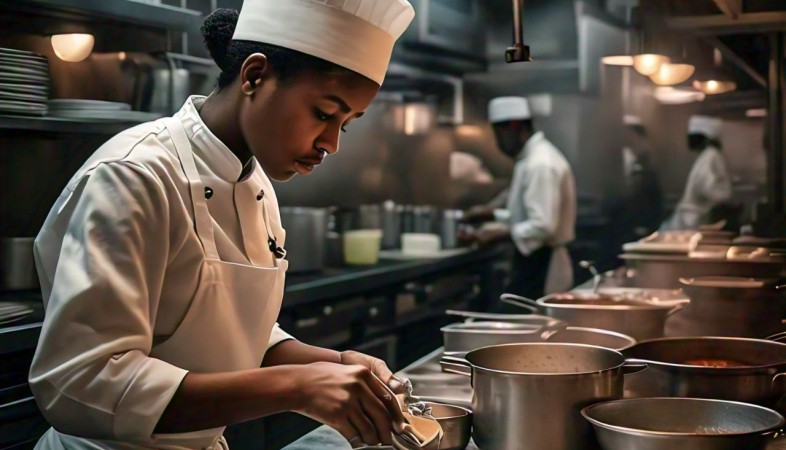How Proper Kitchen Stewarding Enhances Food Presentation and Quality
Kitchen stewards are responsible for maintaining cleanliness, organization, and sanitation in food preparation areas.
Proper kitchen stewarding plays a crucial role in the
culinary world, influencing not only the operational efficiency of a kitchen
but also the overall presentation and quality of food served to guests. Kitchen
stewards are responsible for maintaining cleanliness, organization, and
sanitation in food preparation areas. Their contributions extend far beyond the
basics of dishwashing and cleaning; they are integral to ensuring that the entire
culinary process runs smoothly. By focusing on essential tasks, kitchen
stewards help enhance the visual appeal and taste of dishes, ultimately leading
to an exceptional dining experience.
One of the primary responsibilities of kitchen stewards is to uphold stringent hygiene and sanitation standards. Cleanliness in the kitchen is paramount to prevent foodborne illnesses and maintain the integrity of the ingredients. When a kitchen is organized and well-maintained, it allows chefs to work more efficiently and confidently. This efficiency translates into higher quality food preparation, as chefs can focus on the creative aspects of cooking without being hindered by a cluttered or unsanitary workspace. The attention to cleanliness also ensures that ingredients remain fresh and uncontaminated, further enhancing the quality of the final dish.
In addition to cleanliness, proper kitchen stewarding involves effective inventory management. Stewards are responsible for monitoring stock levels, rotating ingredients, and ensuring that all supplies are stored correctly. This process minimizes waste and guarantees that chefs have access to high-quality, fresh ingredients when needed. By utilizing the best possible components, chefs can create dishes that are not only flavorful but also visually stunning. Fresh ingredients are essential for beautiful food presentation, and the role of the steward in managing these resources cannot be understated.
Moreover, the organization of kitchen equipment and utensils is another critical aspect of stewarding that directly impacts food presentation. When kitchen tools are properly stored and easily accessible, chefs can work more efficiently, leading to quicker preparation times and more precise plating. An organized workspace allows chefs to focus on the aesthetics of each dish, ensuring that every plate is a work of art. The visual appeal of food is often just as important as its taste, and the steward's role in maintaining a tidy and functional kitchen is vital in achieving this balance.
The relationship between kitchen stewards and chefs is also significant in enhancing food quality. A good steward understands the needs of the kitchen staff and works collaboratively to support their efforts. For instance, they may assist in the preparation of ingredients, such as washing and chopping vegetables or marinating proteins, allowing chefs to focus on cooking and presentation. This teamwork creates a harmonious kitchen environment where everyone can contribute to the quality of the food being prepared.
In addition, proper kitchen stewarding can lead to innovative food presentation techniques. As stewards become familiar with the flow of the kitchen and the preferences of the chefs, they can suggest new ways to present dishes that may elevate the dining experience. They can also ensure that presentation tools, such as plates and garnishes, are readily available and in pristine condition, allowing chefs to execute their creative visions seamlessly. The steward's attention to detail can significantly impact how a dish is received by guests, making it visually appealing and inviting.
Lastly, the commitment to sustainability in kitchen stewarding can enhance the overall quality of food. Many stewards are responsible for implementing eco-friendly practices, such as proper waste management and recycling. By reducing waste and using resources efficiently, stewards contribute to a more sustainable kitchen environment. This conscientious approach often leads to better sourcing of ingredients, which can improve the quality of the food served. When restaurants prioritize sustainability, they not only enhance the dining experience but also build a positive reputation among environmentally conscious consumers.
Proper kitchen stewarding is essential in enhancing food presentation and quality. By maintaining cleanliness, managing inventory, organizing equipment, and collaborating effectively with chefs, kitchen stewards play a pivotal role in the culinary process. Their contributions ensure that kitchens operate efficiently, allowing for the creation of dishes that are both visually stunning and of the highest quality. As the culinary landscape continues to evolve, the importance of kitchen stewarding in the pursuit of excellence will remain a cornerstone of the food service industry.
.png)




























